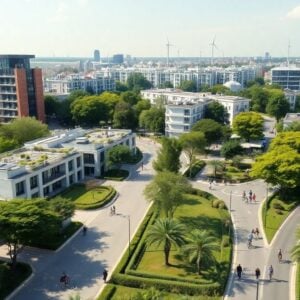The Pacific Islands face urgent climate and energy challenges, including rising sea levels, extreme weather events, and heavy reliance on fossil fuels. Transitioning to renewable energy is seen as a key strategy to enhance energy security and support green local development in these small island nations.
Under the Pacific Green Transformation Project (Pacific GX), a multi-country initiative implemented by UNDP and funded by the Government of Japan, officials from Papua New Guinea, Samoa, Timor-Leste, and Vanuatu visited Okinawa, Japan, for a South-South and triangular knowledge exchange. The mission focused on how clean energy technologies can strengthen sustainable development in island communities while promoting collaboration among countries facing similar challenges.
During the visit, delegates explored innovative projects across Okinawa’s remote islands, including an Ocean Thermal Energy Conversion (OTEC) demonstration in Kumejima, a Retractive Wind Power Generation Tower in Taramajima, and a microgrid in Kurimajima. They engaged with political leaders, city planners, and Okinawa Electric Power Company representatives to understand how clean energy technologies are integrated into development planning, enhancing both energy access and resilience.
A key part of the visit was interaction with students from Tarama Elementary and Junior High Schools, where Pacific Island representatives shared their countries’ energy security and climate challenges. This engagement highlighted the importance of involving young people in climate solutions and building awareness of the risks posed by rising sea levels and extreme climate events.
Delegates reflected on lessons from Okinawa, emphasizing the importance of decentralized, community-driven energy systems. For example, officials from Papua New Guinea and Timor-Leste noted that local ownership and maintenance of renewable energy systems is crucial for effective implementation in off-grid and rural areas. Similarly, Vanuatu highlighted the importance of resilient renewable energy solutions and the potential for public-private partnerships to ensure sustainable deployment.
The exchange built on prior discussions at the ‘Policy Discussion among Leaders of Pacific SIDS Countries’ under Pacific GX, in alignment with the tenth Pacific Island Leaders Meeting (PALM10). Japan reinforced its commitment to global climate action through initiatives like the Pacific Climate Resilience Initiative, aimed at expanding renewable energy access and enhancing climate resilience in the Pacific region.
UNDP played a central role in facilitating this South-South and Triangular Cooperation, ensuring that Pacific countries are co-leaders in the clean energy transition. The visit also strengthened regional networks of energy leaders, fostering partnerships, shared learning, and a collaborative approach to addressing climate and energy challenges.
Overall, the Okinawa mission highlighted the potential of regional cooperation, knowledge exchange, and community-led renewable energy projects to accelerate the Pacific Islands’ transition toward a clean, resilient, and sustainable energy future.







